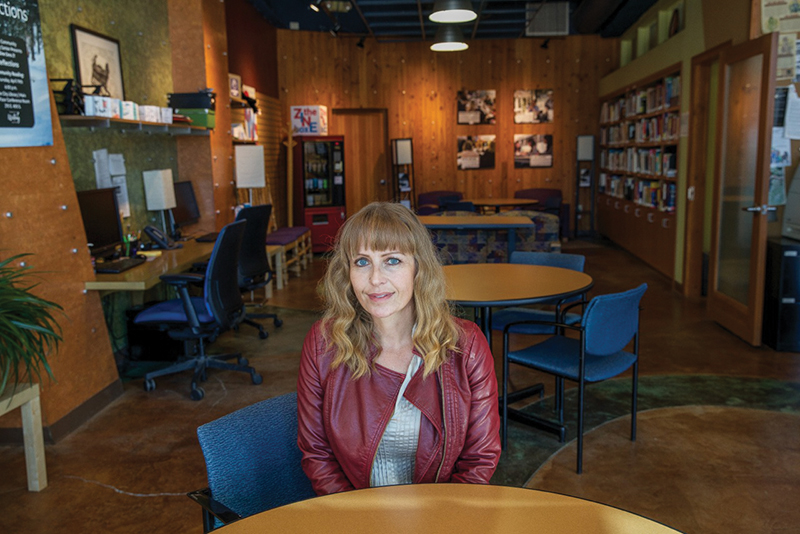
Working to Meet Diverse Community Needs Results in Building a Strong Community
Art
Salt Lake Community College’s Community Writing Center, located in Library Square, has been helping writers of all abilities for 17 years. The CWC provides many services to anyone in the community looking for assistance with whatever writing project they are working on, whether that is a new resume, a grant or a short story. Anyone from any walk of life can find writing support within one of the many programs that the CWC sponsors. One demographic in particular, refugees, has found success with those programs.
Most of the writers seeking the center’s services aren’t necessarily students at the community college, but members of the community at large. There are times when students do use the services in the center, but that usually takes place when the student is working on a piece not assigned as part of their coursework. It is, after all, a community space to cultivate the written word in all of its forms. “Salt Lake Community College values community involvement and partners with the community to provide educational opportunities,” Kati Lewis, Associate Director of the CWC, says. “The CWC offers writing assistance to the public and sponsors a variety of public writing projects.”
There are several ways the CWC serves members of the community with their writing interests. The Writing Coaching program provides writers with a half an hour of one-on-one time with one of the center’s qualified staff members. There are writing workshops that span in subject matter, from memoirs to letters to the editor. These workshops are typically facilitated by writing coaches from the CWC, but sometimes there are guest presenters that bring a specific expertise to a workshop. Another program the CWC offers is Writing Partners, a collaborative effort with community partners to bring the craft into the community to satisfy unmet needs found throughout Salt Lake City’s population. The CWC partners with organizations like the Salt Lake City Public Library and the Salt Lake County Jail. The last program offered through the center is the DiverseCity Writing Series, which features 13 writing groups that meet twice a month to read, review and provide and receive feedback for their work. Many of these groups are the direct result of requests made to the CWC by community partners or prospective partners. “We are always open to new community partnerships and do our best to be responsive to community needs,” Lewis says.
One area of particular interest and need has been within the various refugee communities throughout the valley. The programs offered specifically for refugees are typically connected to the many community partnerships the CWC has developed over the years. One of the DiverseCity Writing Series groups is hosted by the Asian Association of Utah’s Refugees and Immigrant Center in downtown Salt Lake. There has also been a variety of workshops conducted by staffers from the CWC at the Department of Workforce Services’ Refugee Education and Training Center for both youth and adults. Refugees have also participated in writing services in partnership with Catholic Community Services and the International Rescue Committee.
One of the writing groups meeting under the Writing Partners umbrella at the CWC is the Salt Lake Teens Write program. There is collaboration with the Housing Authority of the County of Salt Lake to offer writing activities for the teen programs they oversee. Many of the youth participating in Salt Lake Teens Write are refugees who are interested in writing for a variety of reasons. “Our community partnerships are based on requests from our community partners, so we try to be responsive to the needs articulated by our community partners,” Lewis says. “Some of the needs we’ve responded to include high school/college students working on scholarships or application essays and new refugees developing English writing skills.”
The participants have a wide assortment of writing abilities. Some writers are just learning English and are starting from the beginning, while many write English well and are only looking for new ways in which to apply their skills. The CWC does a great job at meeting the different levels of understanding and expertise by working with each person individually. “We try to be responsive to the needs of each individual writer and help them move forward in whatever direction they choose,” Lewis says.
The CWC is open to new possibilities to establish partnerships and possible team-ups with community members and organizations that have discovered areas of need in terms of writing. Salt Lake’s refugee communities have contributed greatly to the development of programs around the city and to groups aimed at writing.
“Salt Lake has an incredible network to support members of our community who are refugees,” Lewis says. “We’re glad to be a small part of that.”
If other groups are working with refugees and are interested in the CWC’s services or a partnership, they are encouraged to reach out to the center. Anyone interested in the CWC’s many services, go to slcc.edu/cwc.
